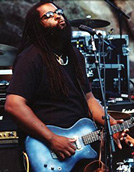 |

Comment
on this story
What:
Alvin Youngblood Hart
When:
Wednesday, Aug. 25, 9 p.m.
Where:
Preservation Pub
|
Whatever You Want To Call It
Alvin Youngblood Hart lives the blues, old and new
by John Sewell
A bastard, mutant offspring of other musical forms, the blues is the basic building block of all western pop music for the last century. Haphazardly spilling its seed wherever it might be heard, the blues has spawned rock ’n’ roll, country, jazz, folk, and almost any sound that is truly and uniquely American.
With such a rich cultural legacy, it’s easy to see how blues is oftentimes viewed as the sound of a bygone era—a museum piece that is a treasure, though it is gathering dust. Nonetheless, there are countless troubadours out there in the hinterlands, renovating and resurrecting those three great chords we all know and love, whether we even know it or not.
If the blues was nothing more than a museum piece, Alvin Youngblood Hart might be its curator. Instead, the Memphis-based artist is on a one-man crusade, preaching the gospel of the blues and gathering converts wherever he may roam.
“I really don’t like to label what I do,” says Hart. “I just play good music. I was born in Oakland, California in the 1960s. And at that time, the guitar was the instrument of renown, so that’s what I gravitated to. I just play what I know.”
Whatever you want to call it, there’s no secret that Hart really knows his stuff. Since the ’80s, Hart has garnered six (count ‘em!) Living Blues Awards, won the Downbeat Critic’s Poll for blues album of the year in 1999, was listed among the New York Times critics’ 2002 pick for top 10 albums, and was nominated for a Grammy in 2003. And that’s just the tip of the iceberg.
Hart keeps the blues sound fresh by stripping it down to its barest essence. With a sound that hearkens back to Robert Johnson or James “Son” Thomas, Hart presents a gut bucket, back-porch sound that bites like 101 proof moonshine but goes down smooth. And in spite of the rough-hewn rambunctiousness of his sound, there’s an inherent humanism and empathy to his work that anyone—well, anyone with a molecule of soul, that is—can relate to.
“Don’t get all caught up in whoever happens to be caught up in the hype—saying that my music is traditional,” warns Hart. “I guess I just happened to be fortunate enough to get exposed to the right kind of music, stuff like Charlie Patton, at a young age.
“When I was young, I spent a lot of time in rural Mississippi. And I was exposed to a lot of that older, dare we say traditional music, at that time. Luckily, I was able to figure out the relationship between the older sound and current music.”
Well known in his own right, Hart has been keeping prestigious company with more mainstream artists like Bonnie Raitt and Koko Taylor. He’s also appeared as a sideman on (among others) albums by the North Mississippi All-Stars and Junior Wells.
Asked if his presence is sometimes utilized to add gravitas to the bill of more mainstream oriented shows, Hart is a bit Cagey. “I wouldn’t say they need me for a seal of authorization, that’s for sure,” says Hart, laughing. “For the most part, I’ve just been lucky enough to have a creative booking agent. And of course I enjoy having the opportunity to play those bigger shows.”
Though Hart has spent most of his career performing solo, lately he’s more inclined toward playing with a full band. “For my next record, I’ll record with the full rock ’n’ roll band,” says Hart. “And I’m not some kind of purist in the studio. If I’m doing a rock ’n’ roll record, I’ll do overdubs. I’m not afraid of the technology.”
As to the Knoxville show, Hart plans to go it alone. “I ain’t bringing nobody but me for that show.”
With almost three decades of playing under his belt, Hart still displays a healthy sense of wanderlust. Playing on the road around nine months per year is standard operation.
“You know, knowing when to say when is always a big question for me,” says Hart. “But as long as I can find people that are interested in booking me somewhere, I’ll probably figure out a way to get there. I just want to keep playing and I’m not trying to get on heavy rotation.
“It’s funny,” says Hart. “In some places they’re really hip to each and every thing you’ve ever done. And other times people want to play the pigeonhole game with you. They want to classify your music somehow. Now what are they calling it these days—‘Americana’?”

August 19, 2004 • Vol. 14, No. 34
© 2004 Metro Pulse
|
|